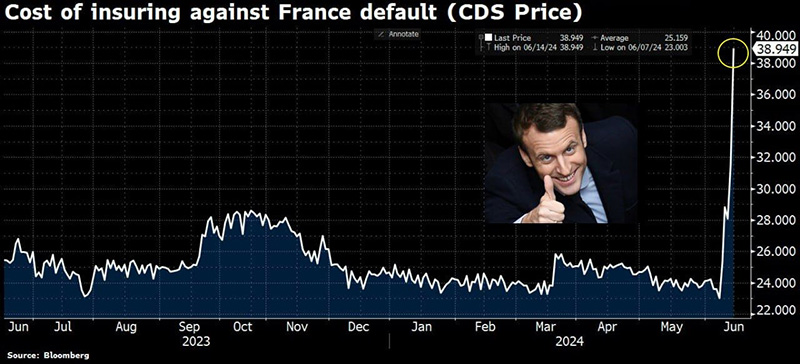
The euro faces the kind of suddenly worsening political backdrop that would typically have investors dumping the currency. But the picture is clouded by an increasingly hard-to-read outlook for global interest rates. The EU parliamentary vote results took on a new dimension last week after French President Emmanuel Macron called a snap election, Bloomberg stresses.
The prospect of a far-right prime minister, whose commitment to the euro project might be less than total, prompted investors to dump French assets. Frexit is suddenly a non-negligible concern and financial markets eschew political volatility. The German ruling coalition suffered a similar drubbing with opposition right-wing parties performing better. The only clear governing party winner was Italian Prime Minister Giorgia Meloni’s right-wing Brothers of Italy.
 British Prime Minister Rishi Sunak & Italian Prime Minister Giorgia Meloni.
British Prime Minister Rishi Sunak & Italian Prime Minister Giorgia Meloni.
But the more profound influence on currency-market dynamics might be the UK swapping places with France in the political stability stakes. Britain's opposition Labour Party is on course to win a large majority on July 4, potentially ushering in five years or more of government constancy after eight years of melodrama since the 2016 Brexit referendum vote in the minds of investors. It would be a dramatic role reversal if from next month France were to endure so-called cohabitation with a prime minister from a different party and fiscal philosophy to Macron. Finance Minister Bruno Le Maire suggested on Friday that he may not remain in his post following the elections.
Until the results of the final-round voting on July 7, the yield premium of French government bonds over German bunds, which jumped by a record to a seven-year high last week, is likely to remain elevated. It doesn't help that France and Italy may soon be subject to so-called Excess Deficit Procedure from the European Commission. Recent deteriorations in their respective annual budget deficits combined with an increase in overall debt means Brussels may have to get serious.
There have already been twin downgrades of France's credit rating to AA minus — first by Fitch Ratings on Oct. 20, followed by S&P Global Ratings on May 31. Moody's Investors Service, which currently has France one notch higher on Aa2 with a stable outlook, said last week that “potential political instability is a credit risk given the challenging fiscal picture the next government will inherit.” Further downgrades, at least to the rating outlook, look inevitable.
The global reserve currency status of the euro is also under threat, as a report from the ECB published on Wednesday highlights. Foreign central banks have cut their holdings of euros by more than €100 billion in the past year, lowering its global share to a three-year low of 20%. Both Japan and Switzerland have liquidated foreign exchange reserves to defend their own currencies.
Russia once held nearly half of its reserves in euros, as a diversification strategy away from the dollar. This methodology is under question now that the Brussels-based depositary Euroclear isn’t releasing any securities from Russian state accounts. Group of Seven leaders agreed on Thursday to transfer $50 billion of profits from Russian-owned bonds to aid Ukraine. This comes just as the euro zone imposed increased tariffs on Chinese electric vehicles, a move that could hamper trade flows with China likely to retaliate.
The parting words from ECB President Christine Lagarde at the press conference following the June 6 cut in interest were "have a nice summer,” interpreted as a message that the next meeting on July 18 is unlikely to see a second consecutive reduction.
The ECB has a much weaker economy to support, but it will struggle to continue to fly solo. When, and whether, the Federal Reserve lowers borrowing costs will have much more profound ramifications. US Treasury yields, and in turn the dollar, set the picture globally.
Lagarde has repeatedly pushed back hard on accusations that the ECB is in effect Fed-reliant; but her proclaimed data-dependency masks that it’s not just euro zone data that sets policy, but US numbers and the Fed’s reaction. Speculating on the euro’s political or economic future is best conducted as far away from the dollar’s influence as possible — otherwise the risk of getting whipsawed is high.
read more in our Telegram-channel https://t.me/The_International_Affairs

 11:36 19.06.2024 •
11:36 19.06.2024 •






















